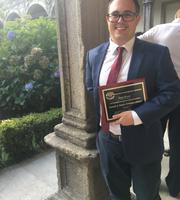New research has put to the test long-held beliefs that reducing the use of sedative medications in aged care facilities would worsen symptoms.
Clinica data was collected from 28 of the 150 facilities involved in RedUSe (Reducing Use of Sedatives) - a University of Tasmania-led project aimed at reducing the use of psychotropic medications (specifically antipsychotic and benzodiazepines) in residential aged care facilities across Australia.
Researchers actually found possible benefits with reduced dosages.
The RedUSe project involved residents and aged-care staff and was first trialled in 2008 with 25 Tasmanian facilities, before expanding nationally to 150 facilities from 2014-2016.
Through his research, School of Pharmacy and Pharmacology lecturer and registered pharmacist, Daniel Hoyle, wanted to challenge one of the main barriers to reducing the use of psychotropic medications, namely a belief that a reduction in medication would result in a worsening of symptoms.
“There has been a long-held belief that if you were to cease or even reduce the dose of these medications, then symptoms would get worse,” Mr Hoyle said.
“We felt it was really important to address these concerns through this research.”
Mr Hoyle analysed the relationships between dose changes to antipsychotic (e.g. risperidone, quetiapine) and/or benzodiazepines (e.g. oxazepam, temazepam) and resident outcomes.
In particular, Mr Hoyle sought to understand if reducing the use of the medication would result in the worsening of behavioural and psychological symptoms, social engagement and quality of life.
Reducing these types of medications generally did not worsen symptoms, such as agitation, anxiety or sleep disturbances, or social engagement or quality of life.
What we actually found were possible benefits including trends towards less agitation after reducing antipsychotic and benzodiazepine doses, and improved quality of life and social engagement.
The RedUSe project was led by Dr Juanita Breen, from the Wicking Dementia Research and Education Centre, where the project found a multi-strategic intervention can reduce psychotropic medication overuse in facilities.
Mr Hoyle led the latest research paper, Clinical impact of antipsychotic and benzodiazepine reduction: findings from a multicomponent psychotropic reduction program within long-term aged care.
His work was awarded first place in the 2019 International Psychogeriatric Association Junior Researcher Awards.
